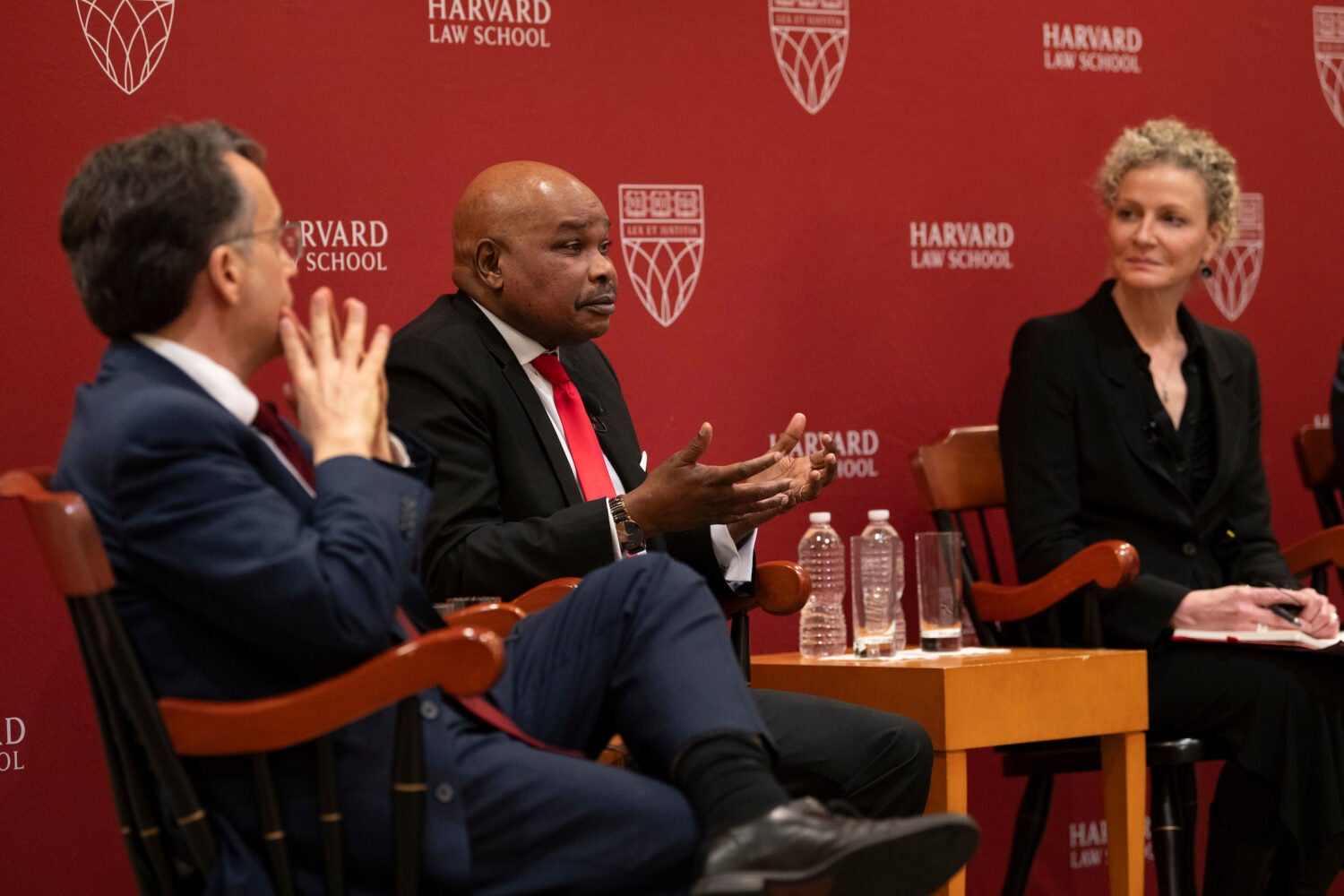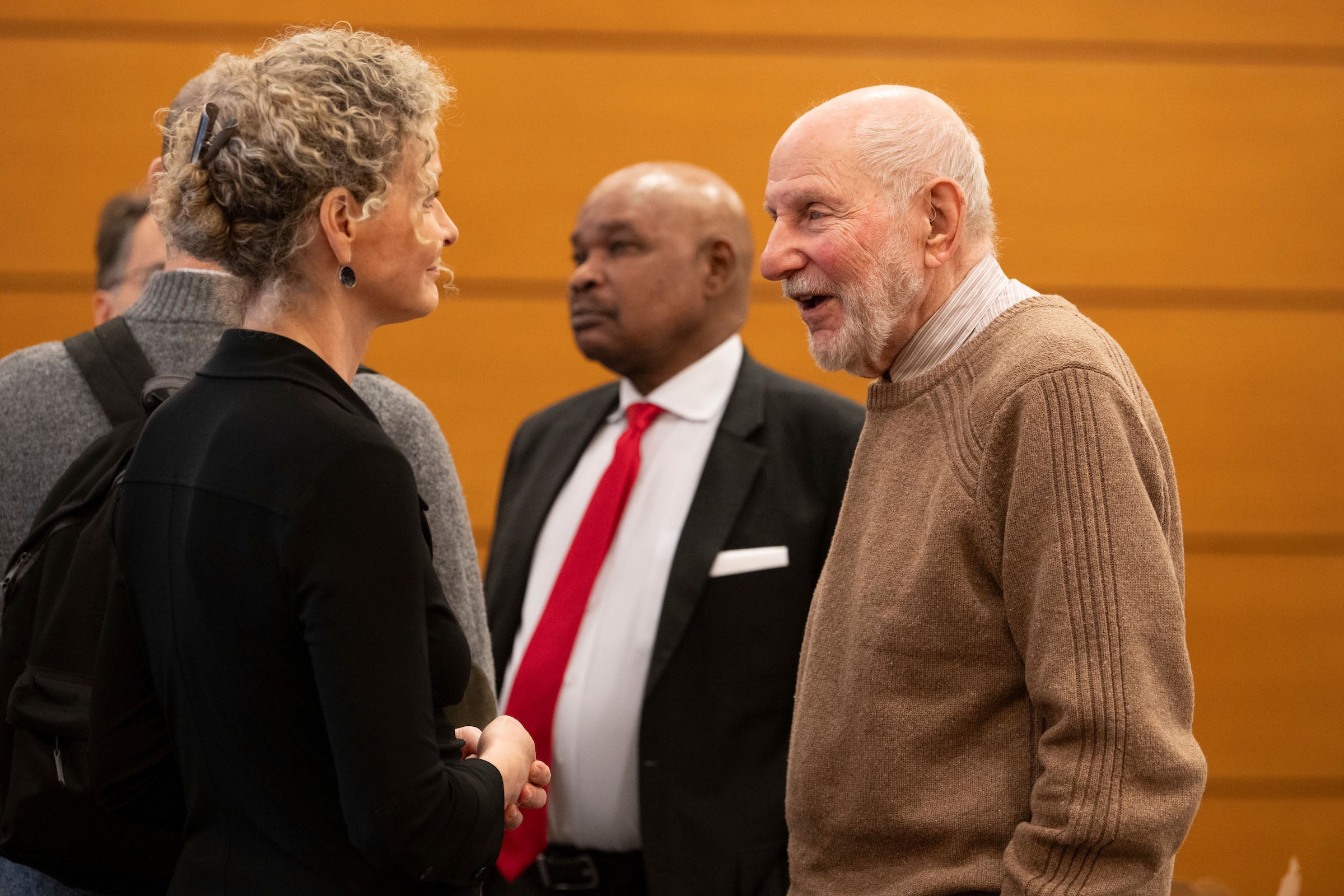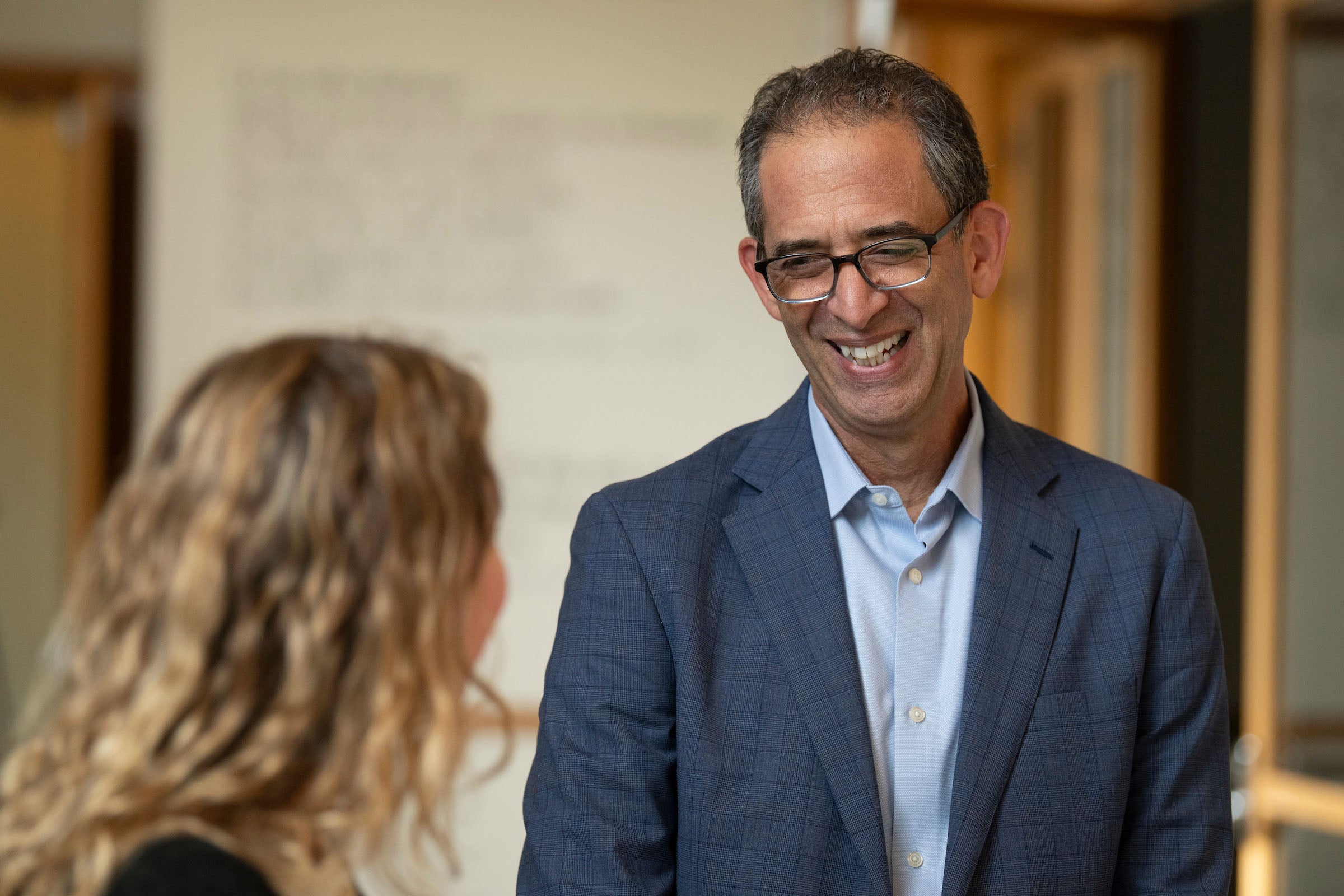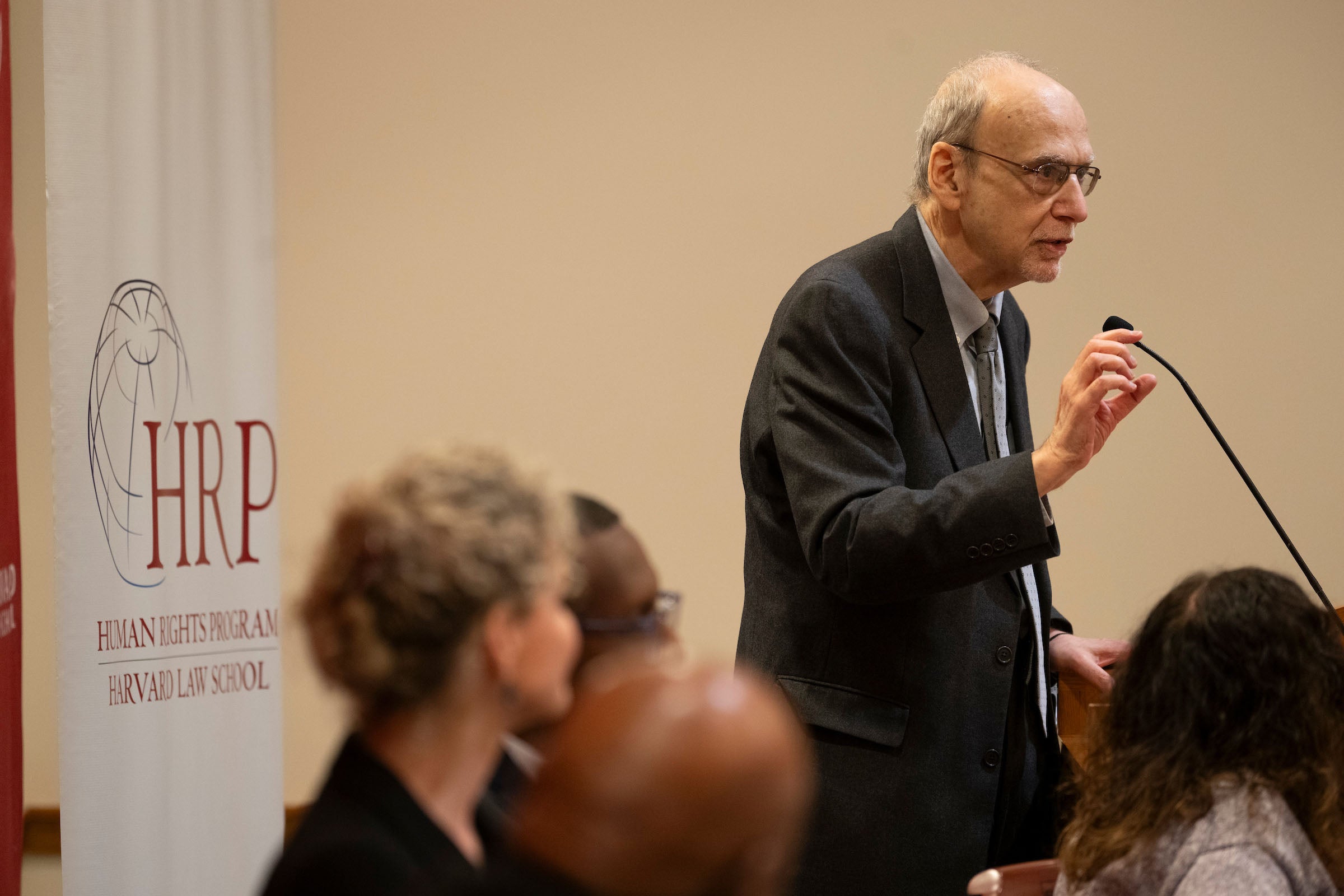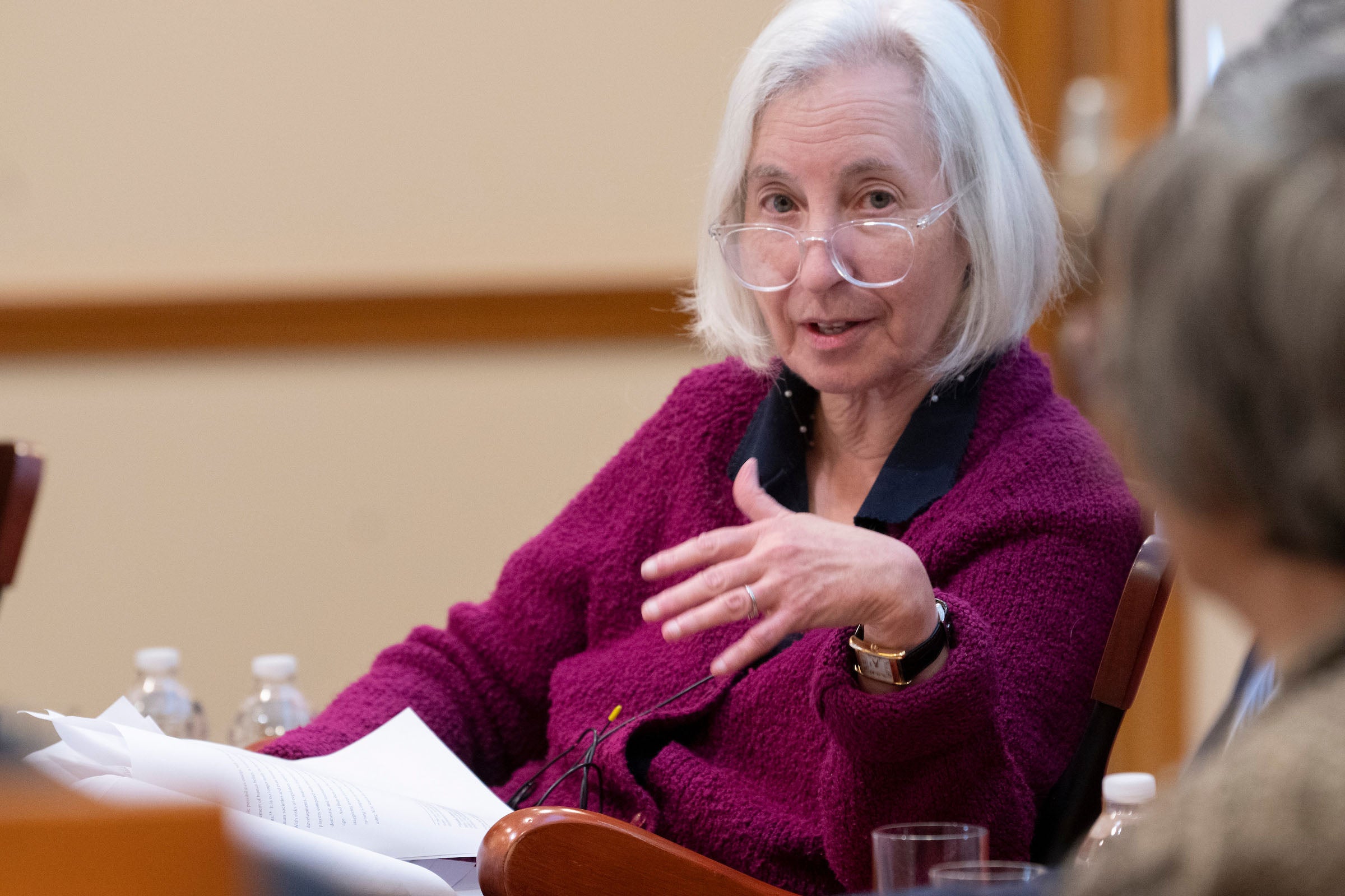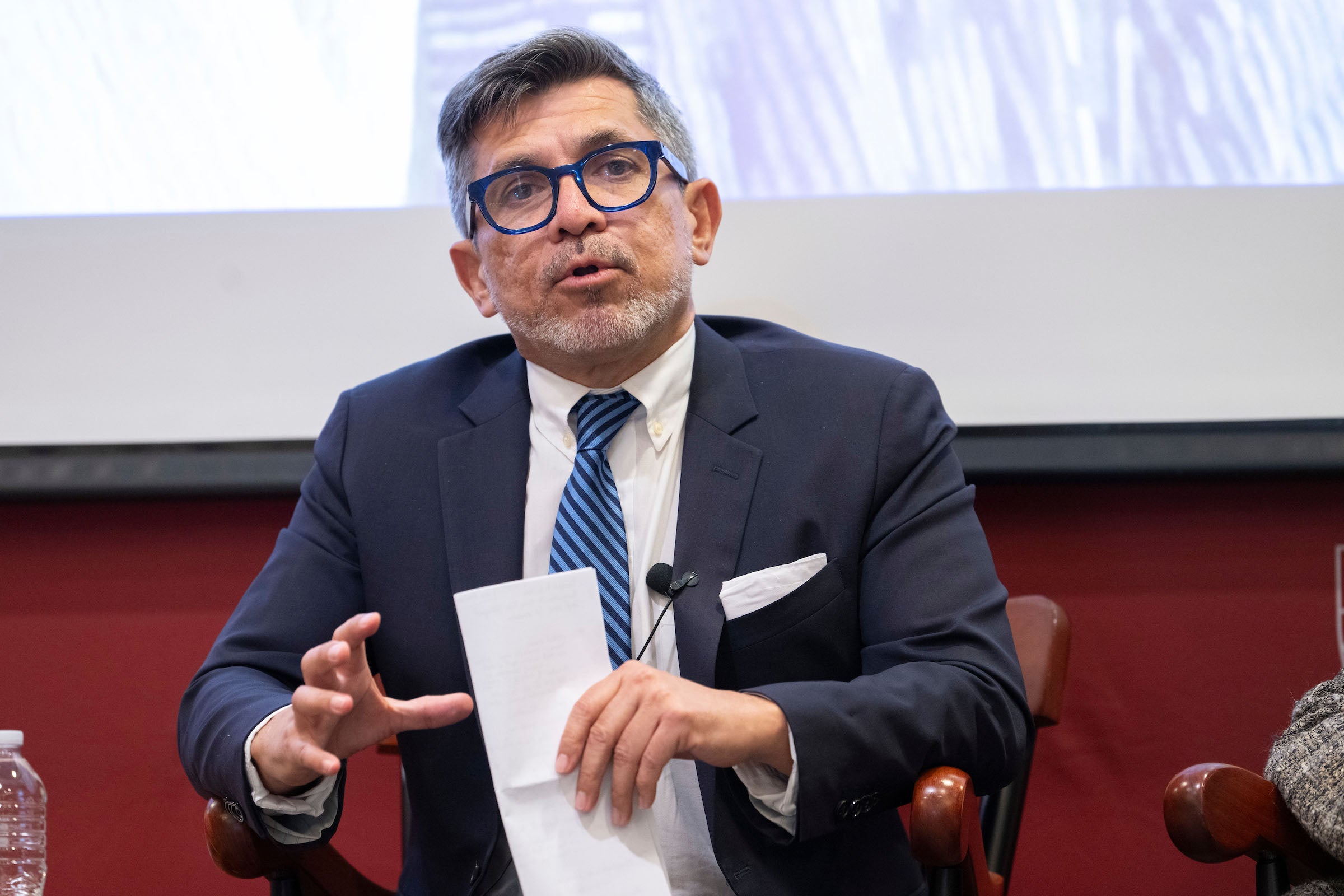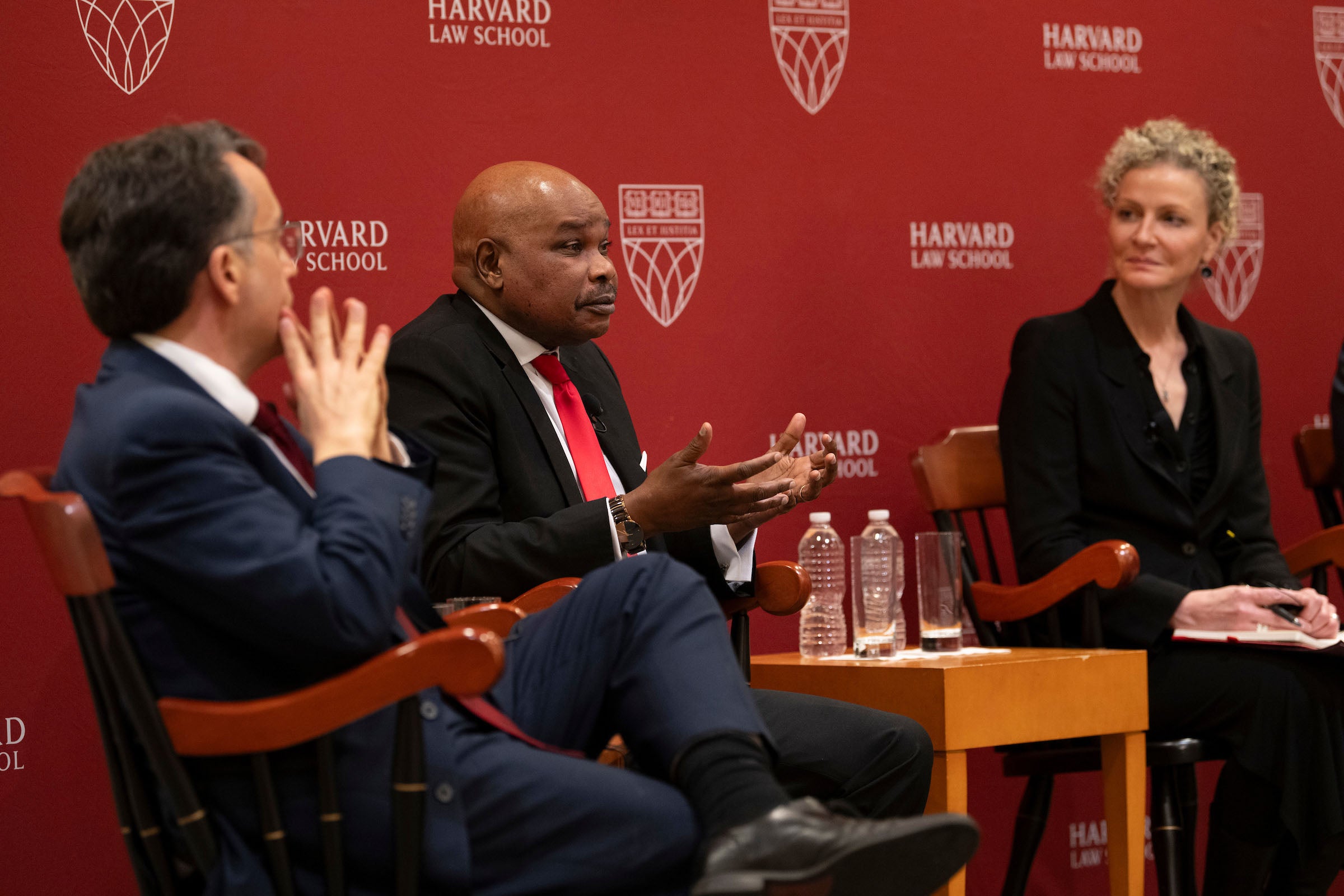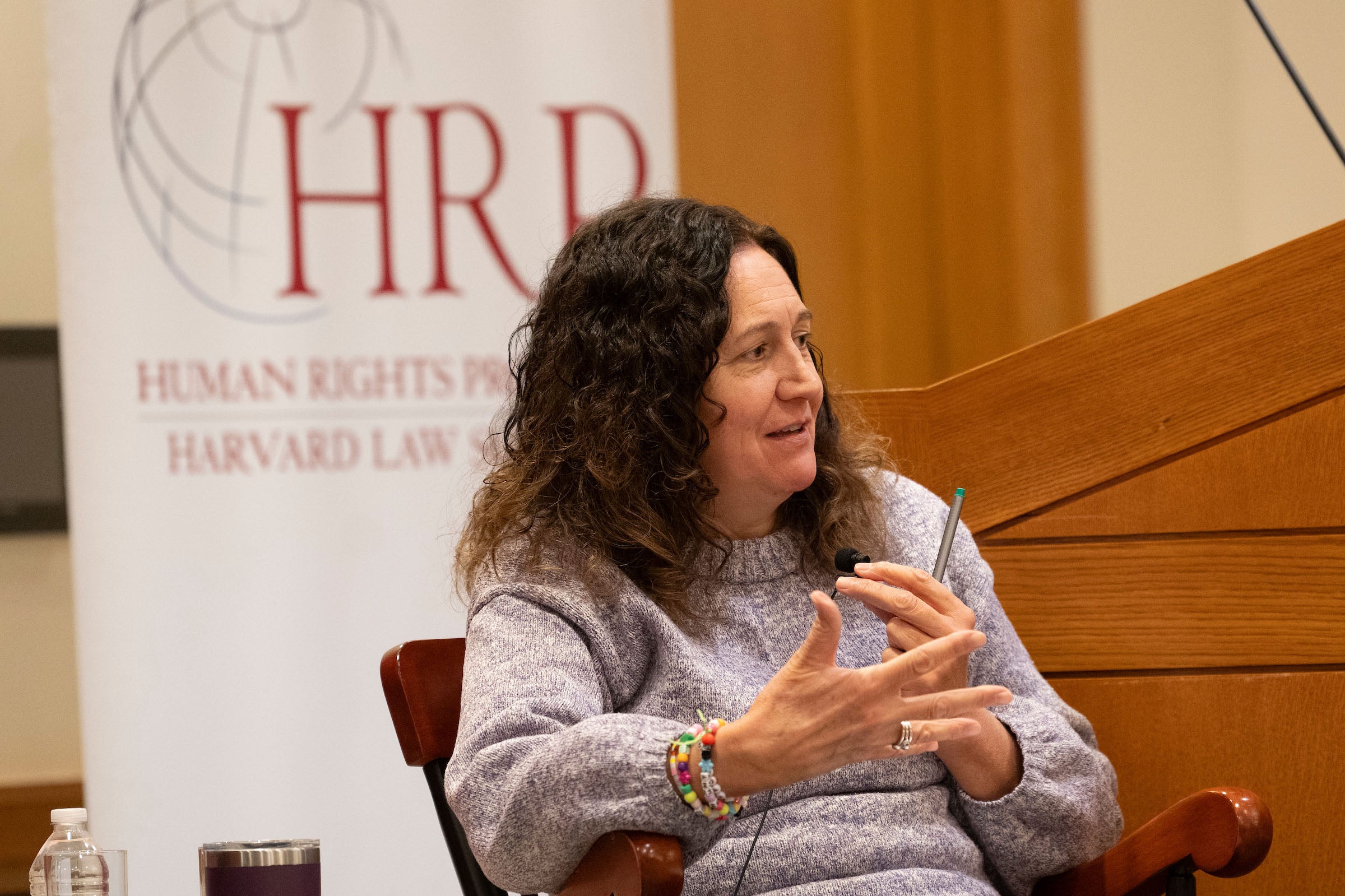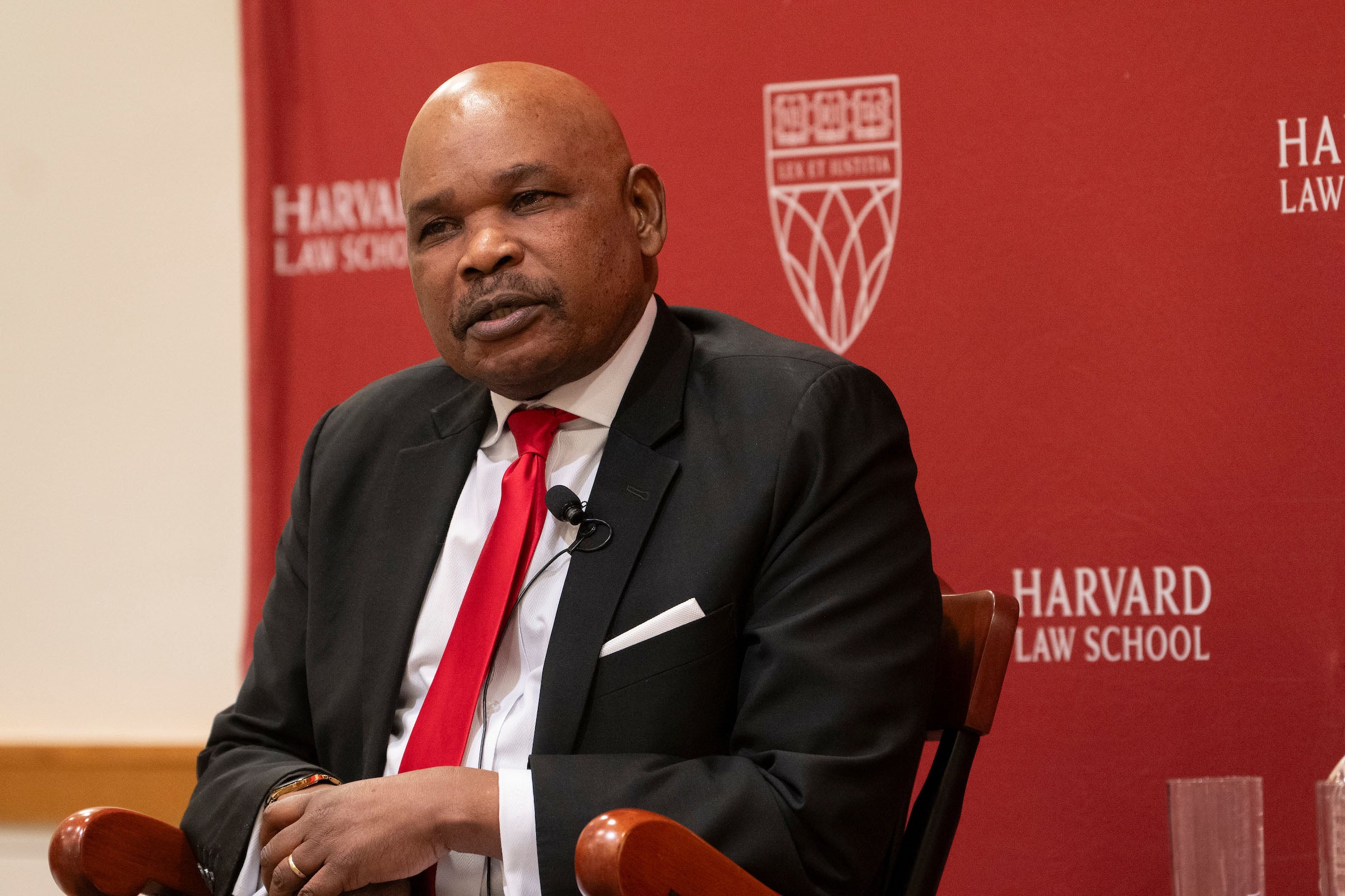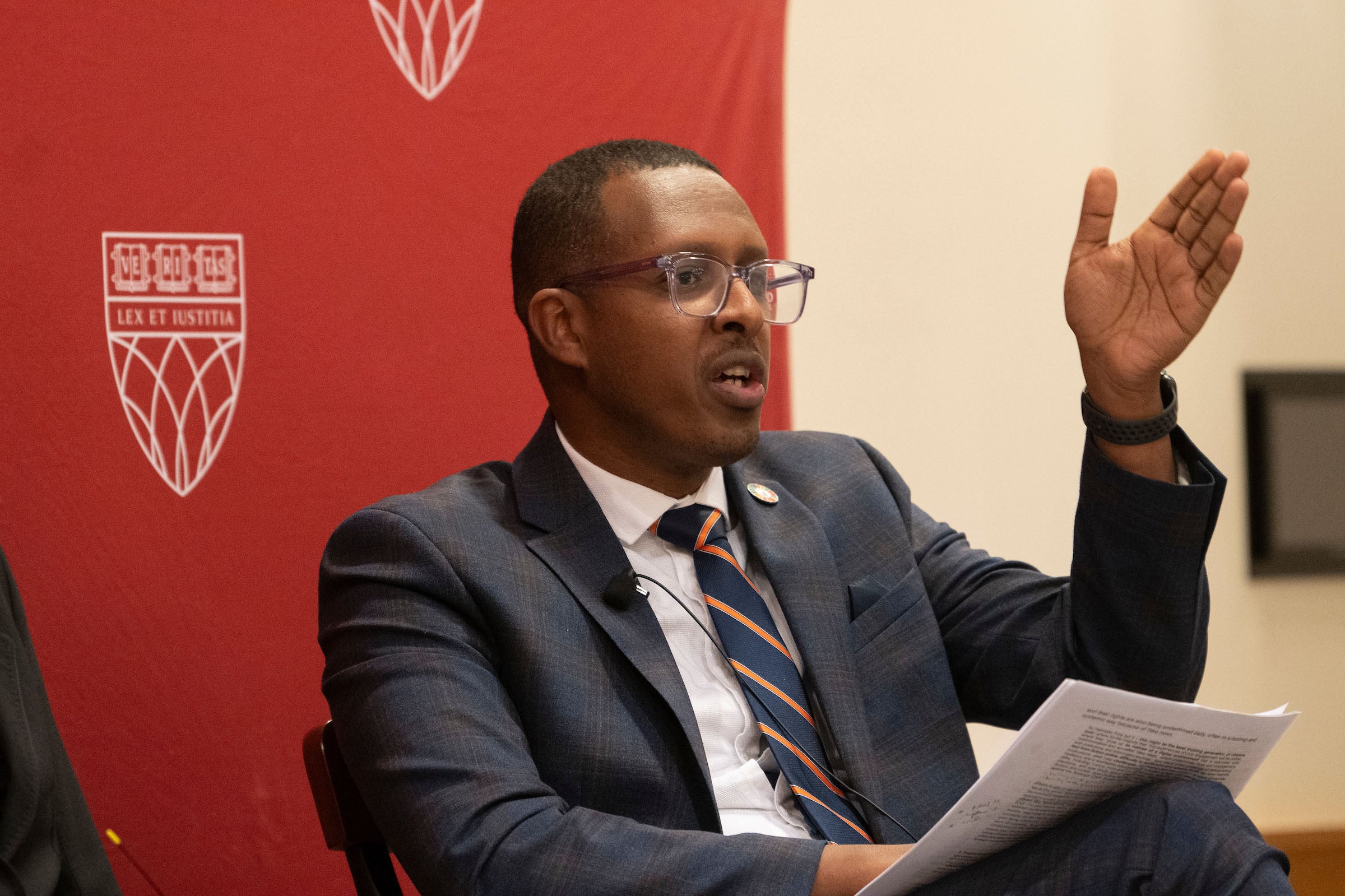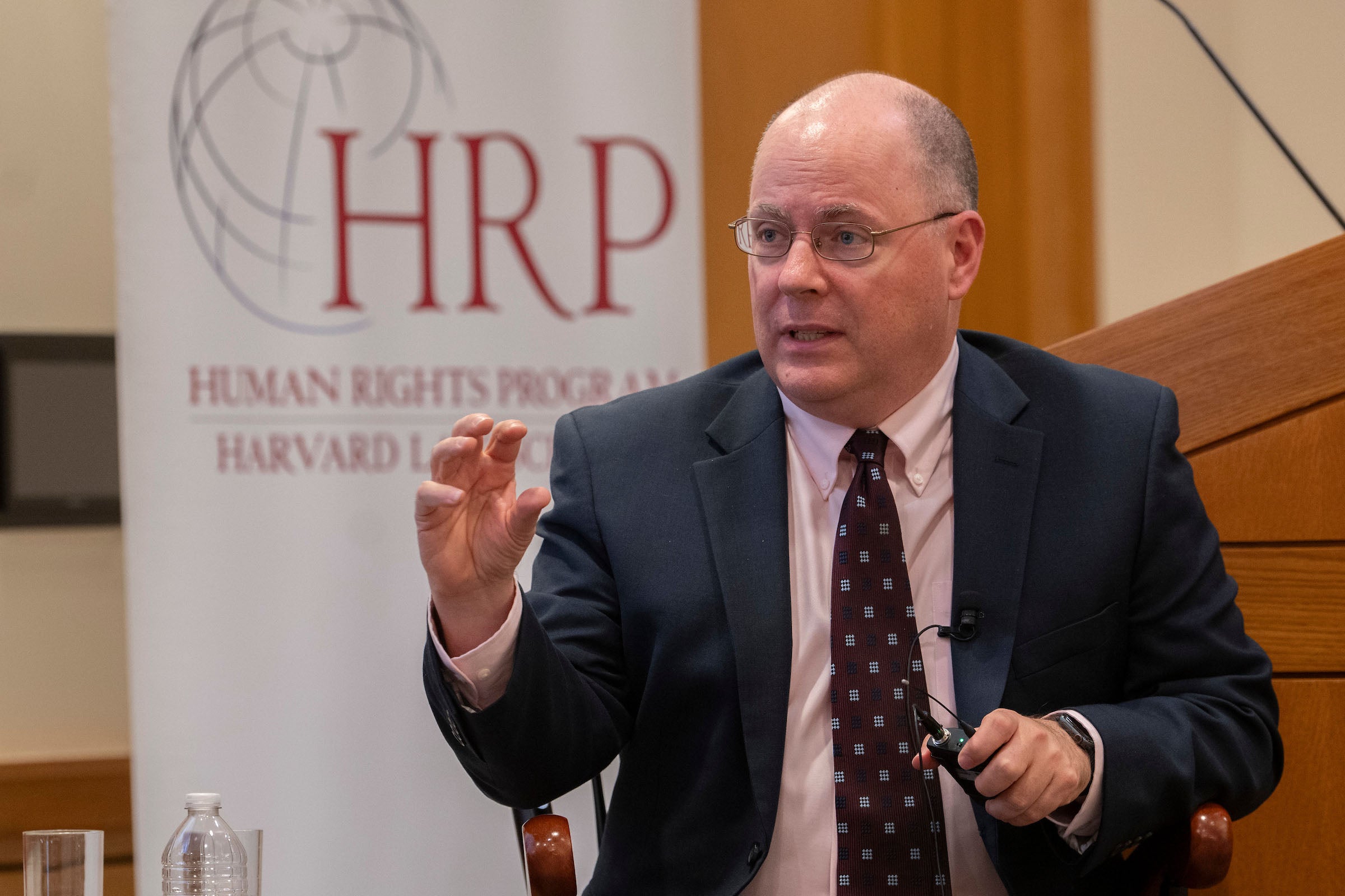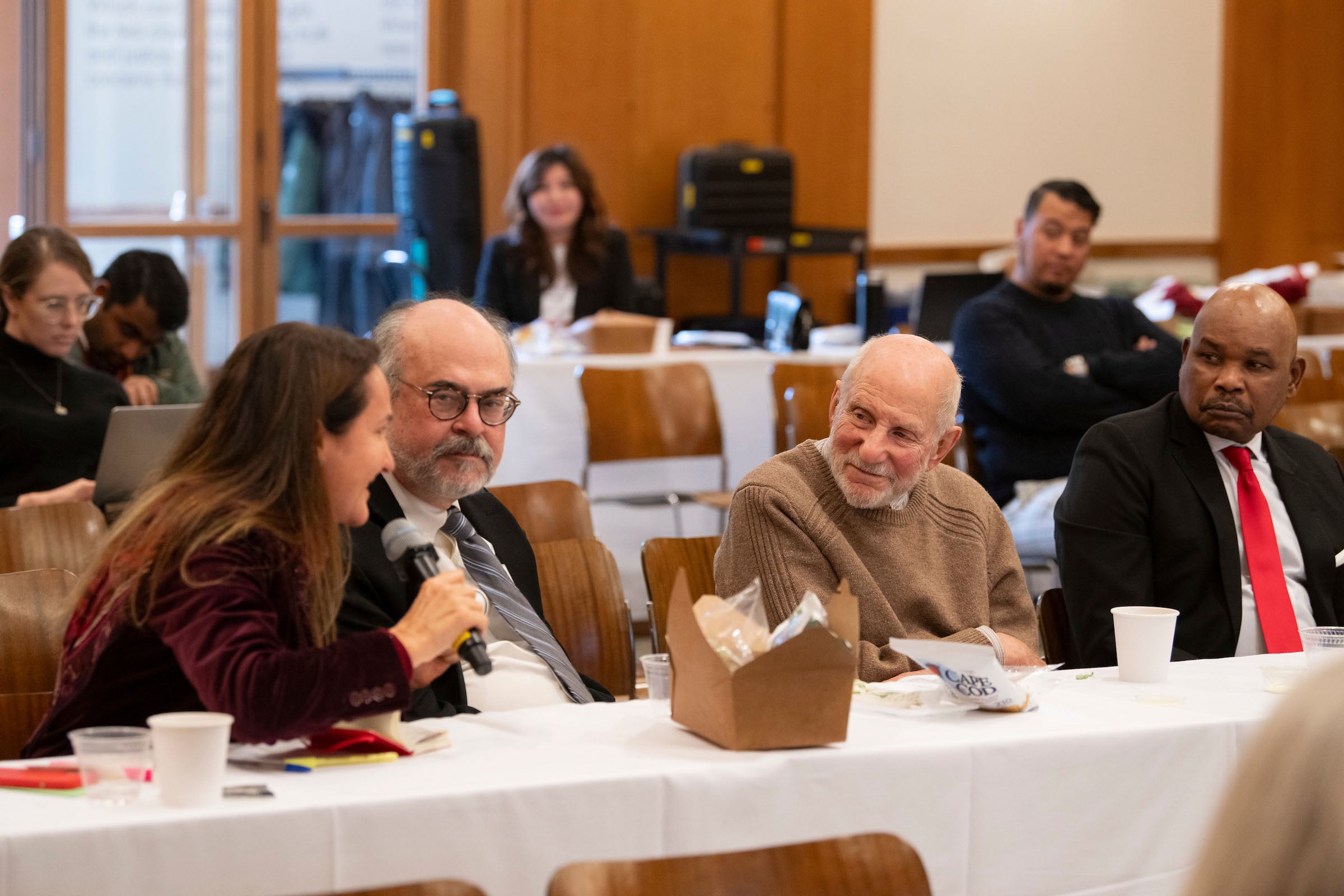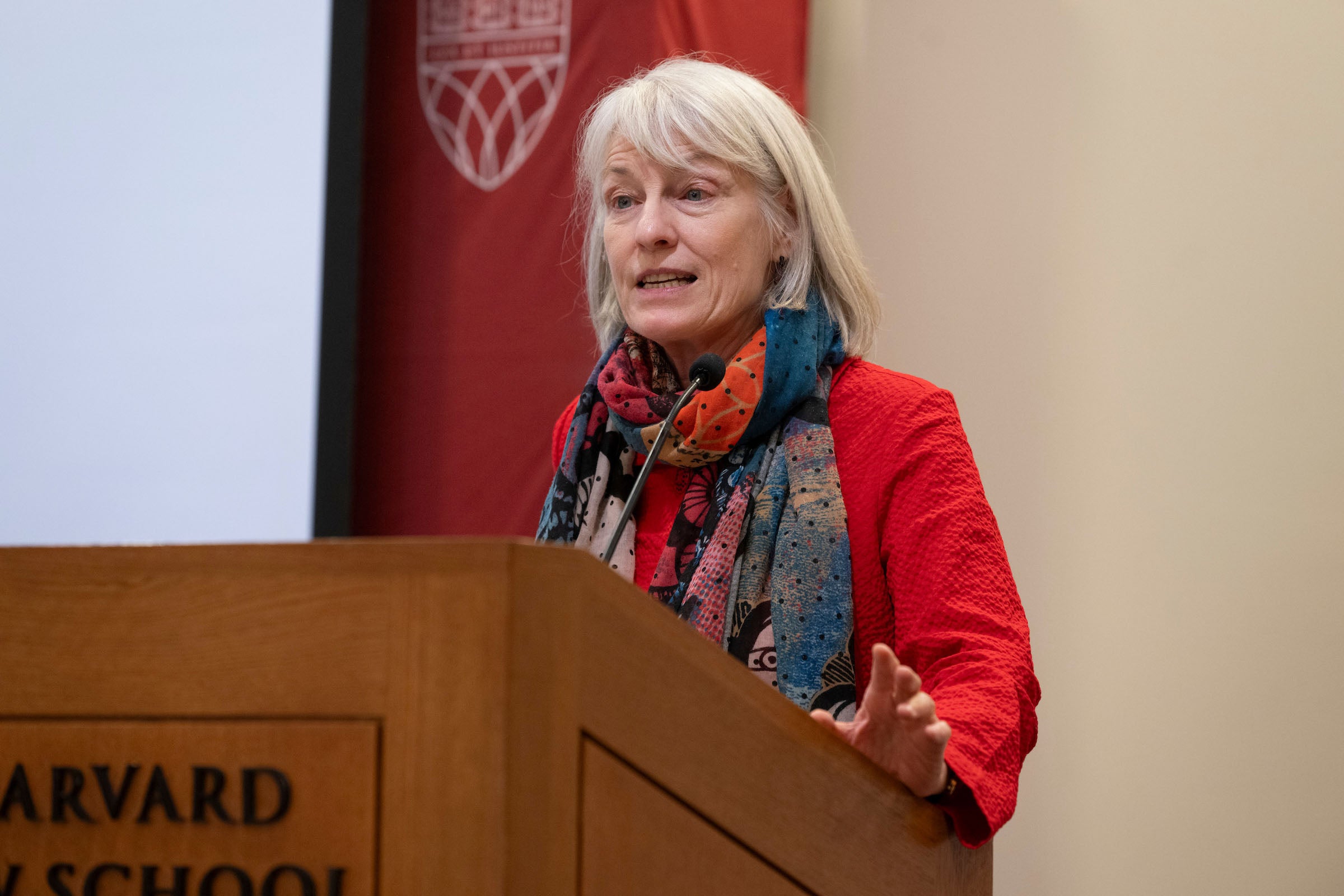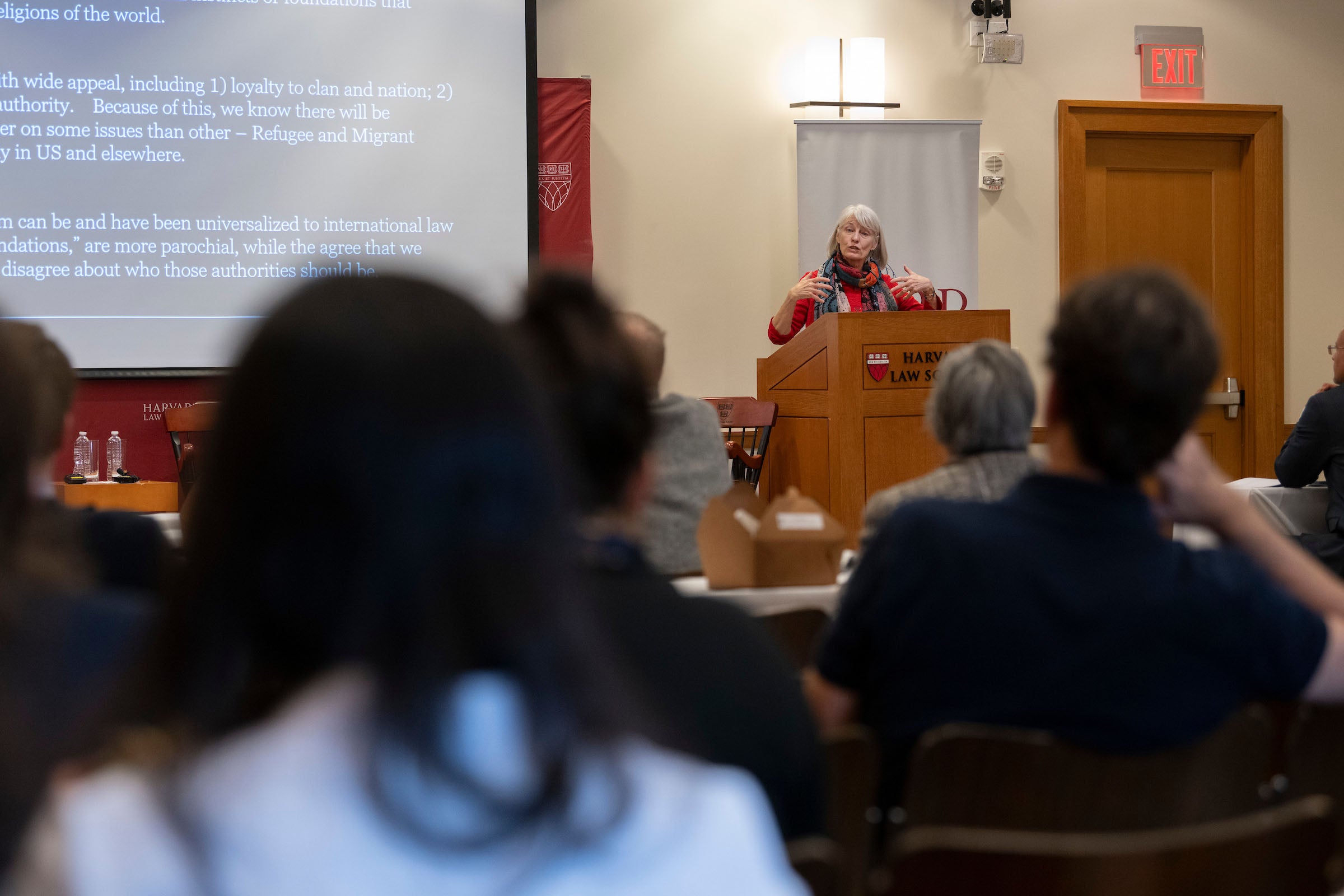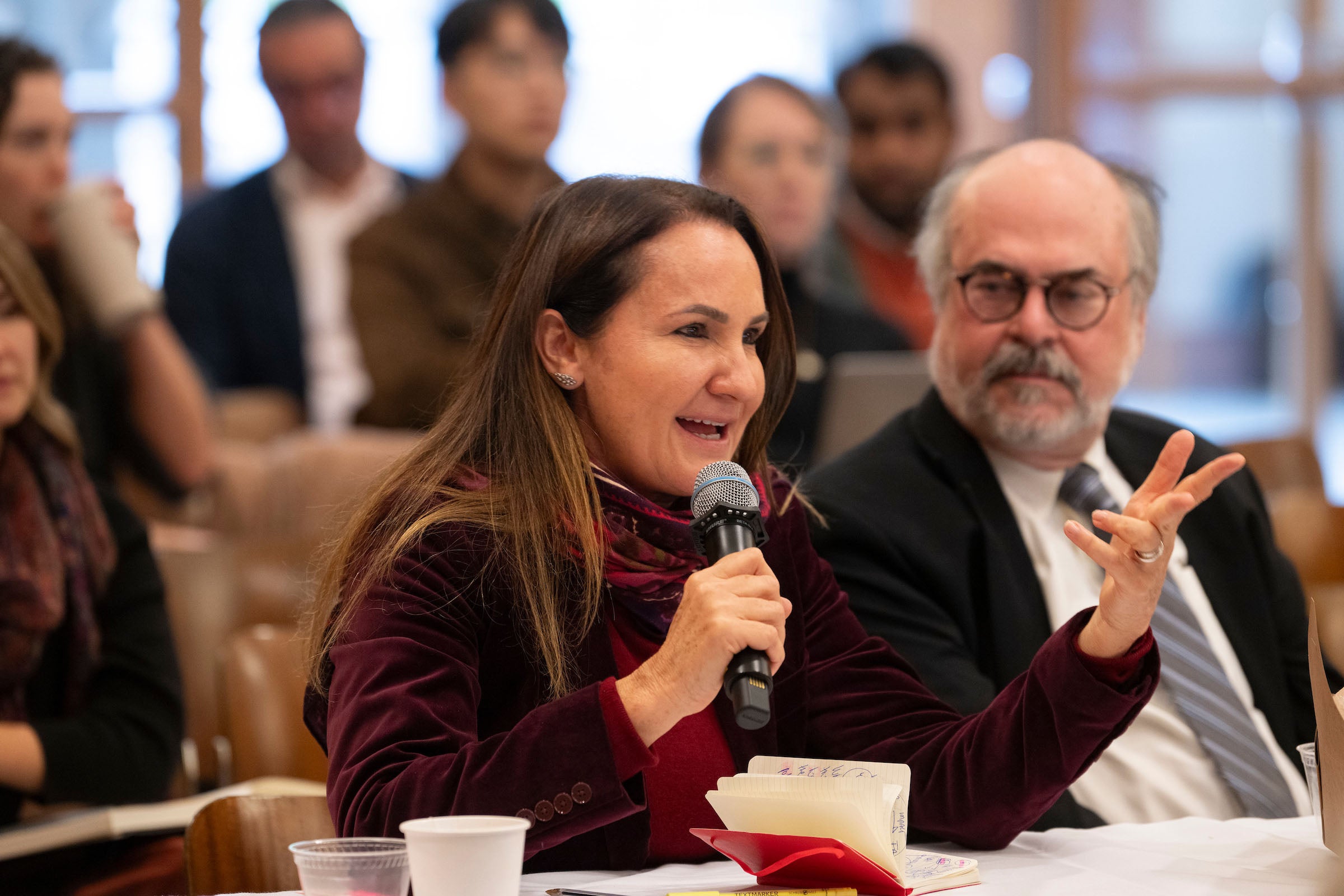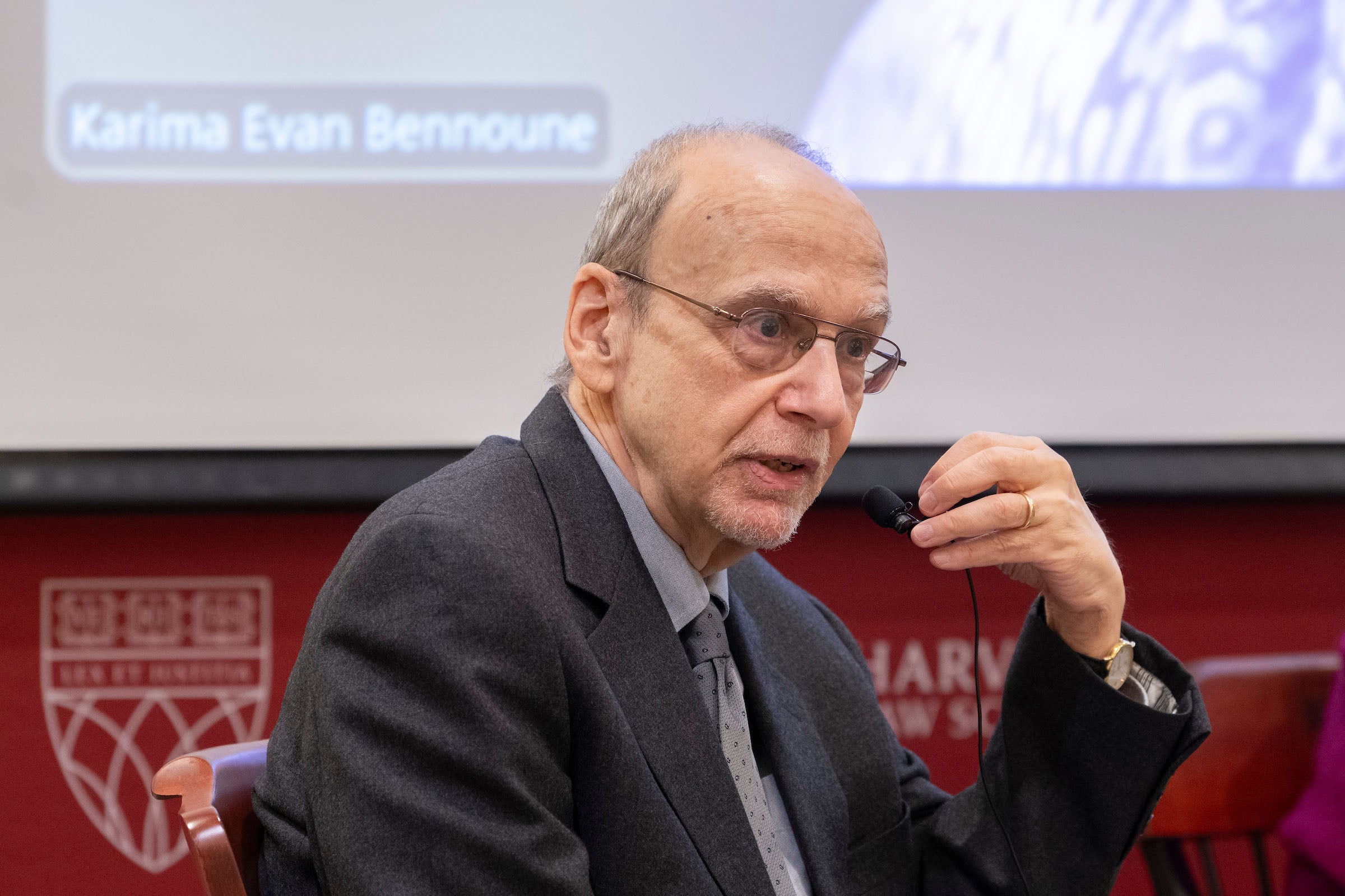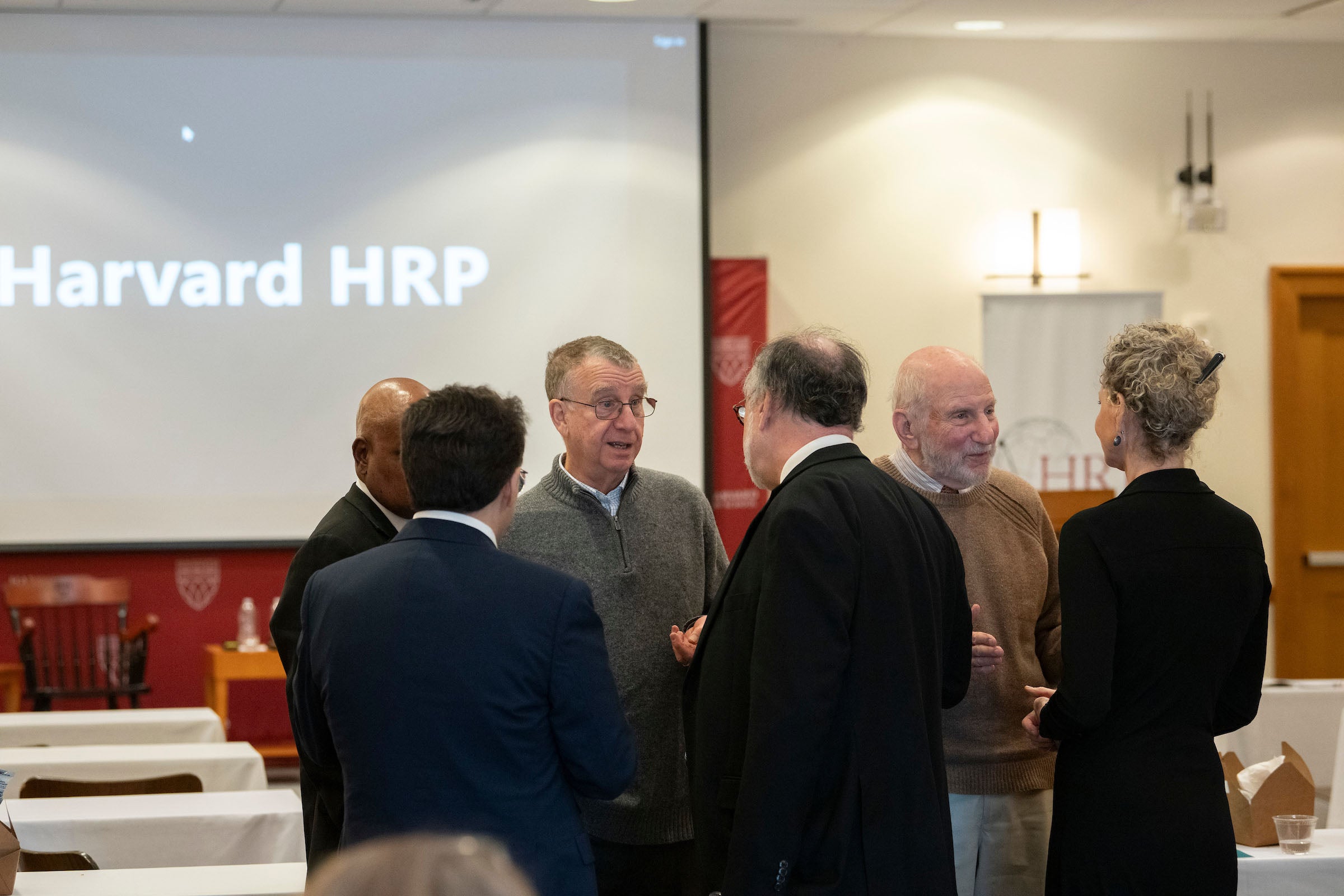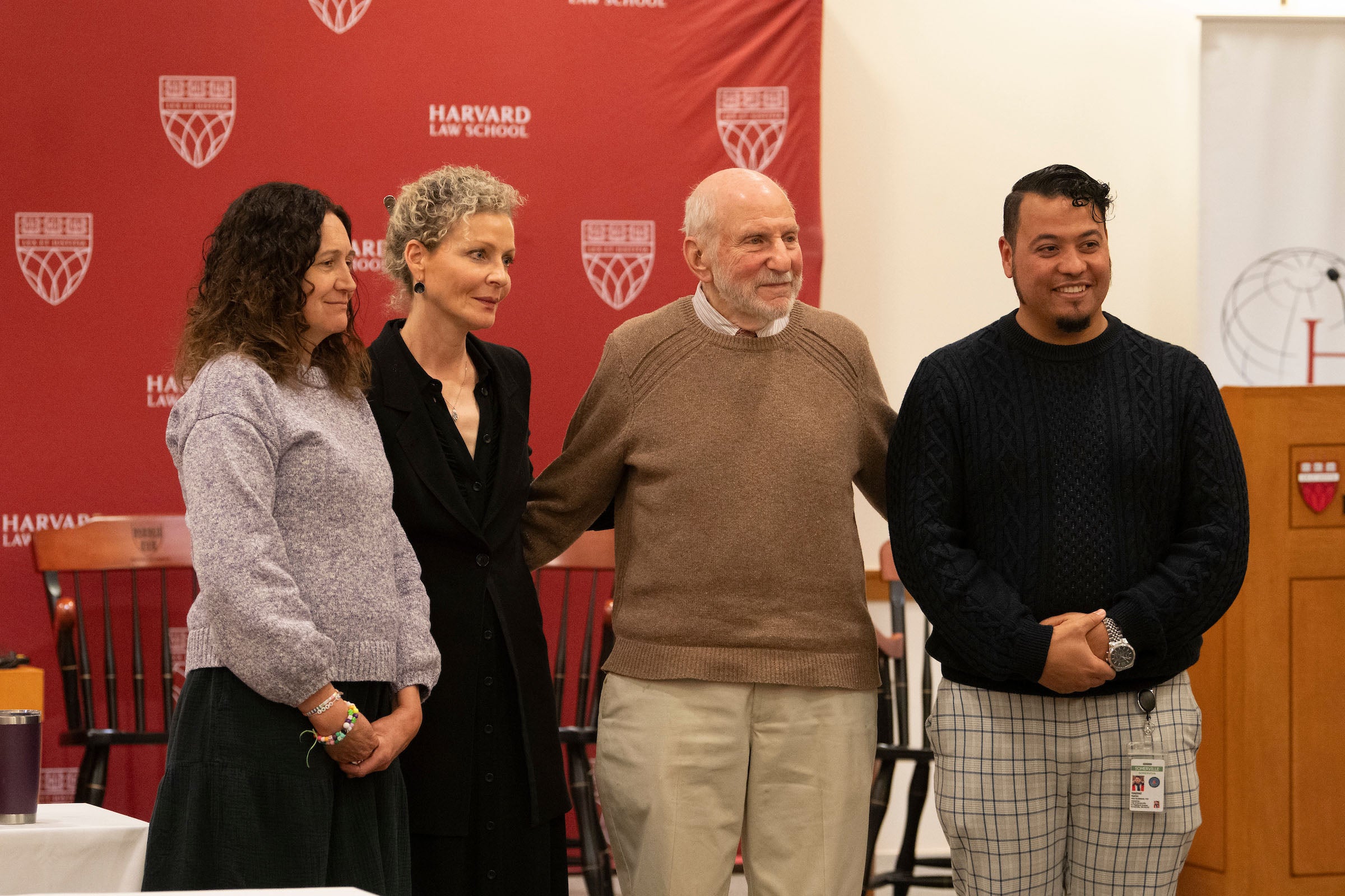The creative promise of artificial intelligence may soon be harnessed to undercut some very real human rights.
AI isn’t generally considered a concern when pondering threats to such rights. But former Harvard Law School Dean Martha Minow warned recently that AI is an “emerging frontier” in a new rights struggle, saying “it’s no longer the domain of science fiction writers to be warning about the extinction of human societies, and even of humans, due to potential deployment of AI, particularly in weapons systems.”
Her talk was part of a daylong symposium on Oct. 17, “Envisioning the Future of Human Rights,” that commemorated the 40th anniversary of the Human Rights Program at Harvard Law School. Beginning with a keynote address by Kathryn Sikkink, the Ryan Family Professor of Human Rights Policy at Harvard Kennedy School, the event featured two roundtable panels that examined the state of human rights and equality, and proposed ways to reimagine the field for the future.
As moderator and clinical professor Tyler Giannini, who leads the Human Rights Entrepreneurs Clinic, said while introducing the first panel, “This is a place of cultivating hope and futures in the wake of battles and fires that we’re fighting.”
Minow, who is the 300th Anniversary University Professor at Harvard University, cited ways that AI is changing lives for worse and better — from the online surveillance when you click a link to improvements in therapeutic drugs, to chatbots that sometimes help children in crisis. But what looks like a solution sometimes just creates a new problem.
“Recent research,” she said, “shows that young children are more vulnerable than adults to trusting AI chatbots too much, investing in them confidence and belief, really confiding in them … But let me tell you, however impressive these chatbots are, they do not have empathy, and they do not have the child’s interest at heart.”
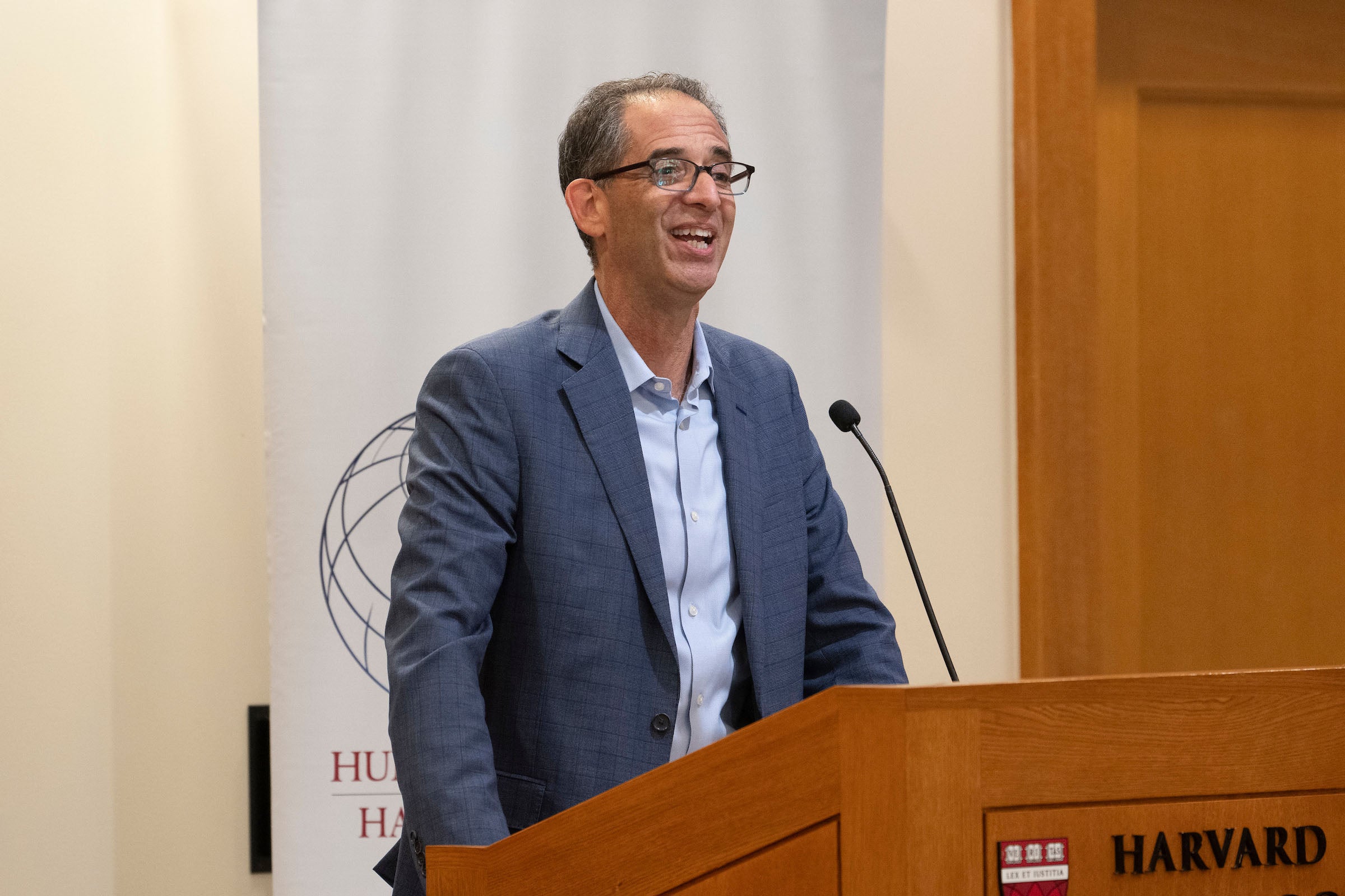
AI, she said, is the “new gold rush” and profit-making companies are devoting their energies to it all over the world. The International Guiding Principles for Organizations Developing Advanced AI Systems, introduced last year, are strictly voluntary. The most-stringent and binding AI law, the E.U. Artificial Intelligence Act, is “quite limited and as my friends at MIT tell me, it’s already out of date.” With the spread of deepfake videos and more sophisticated chatbots, “It’s not pie in the sky to be thinking about the dystopian possibilities that AI could take control of many aspects of human life — not only in violation of the U.N. Universal Declaration of Human Rights, but in violation of humanity.”
Citing a study being done by a Harvard doctoral student, she outlined a rising inequality between people who have the privilege and wealth to bypass AI to speak to a real person, and those who get “lost in automated hell.” This “analog privilege,” she said, will affect decisions on employment, schooling, banking, and receiving urgent medical care.
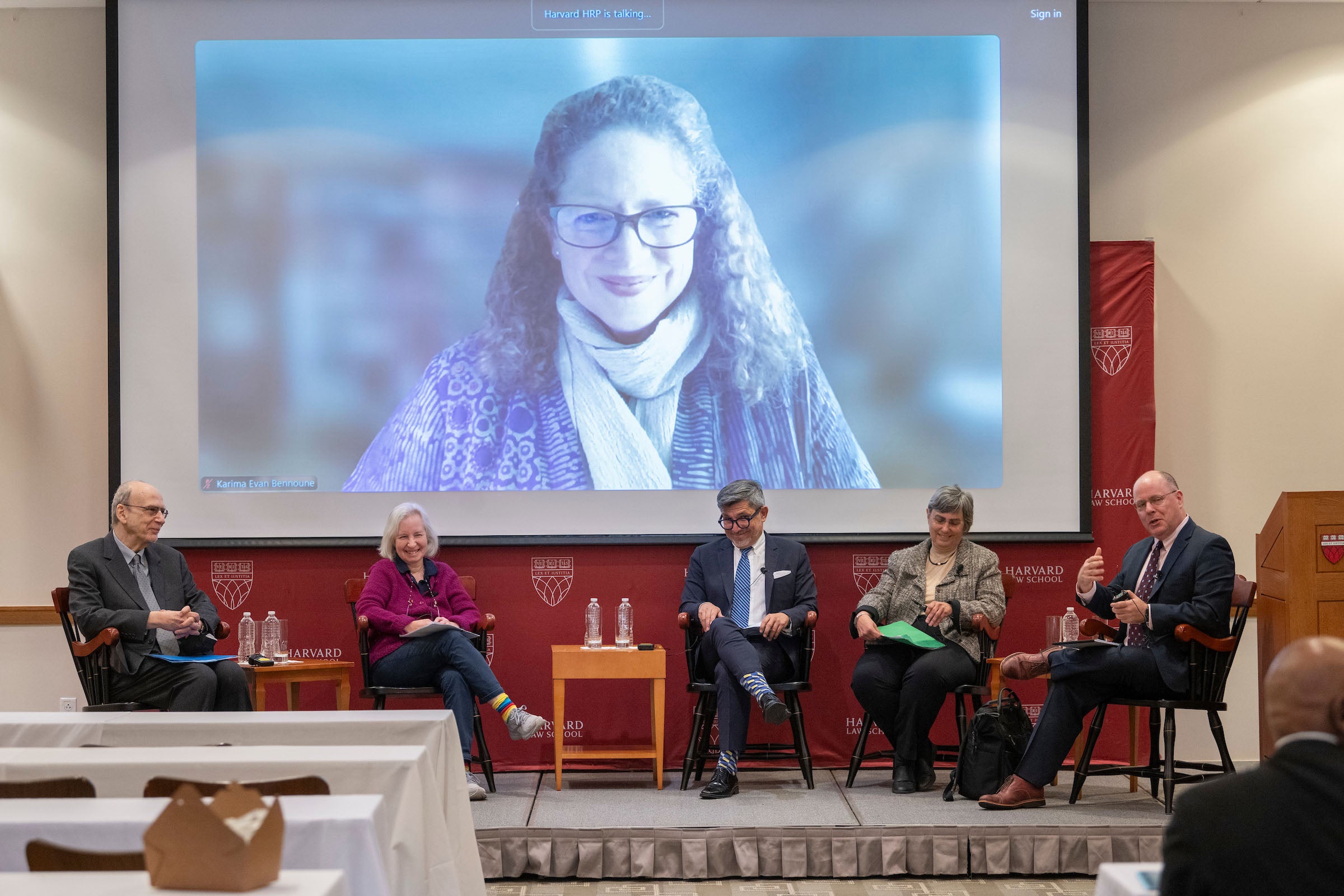
Human rights and gender identity is an area where the legal system has shown clear progress, said Victor Madrigal-Borloz, a lecturer on law and the Eleanor Roosevelt Senior Visiting Researcher. He recalled dark days in 1984, when the AIDS epidemic led to worldwide discrimination. “There was criminalization of same-sex sexual intimacy pretty much everywhere in the world … the idea of sexual orientation or gender identity as points of entry into the analysis of discrimination was not yet crafted.”
This began to change, he said, with Toonen v. Australia, a landmark human rights complaint brought before the U.N. Human Rights Committee, which held, in 1994, that sexual orientation was included in anti-discrimination provisions as a protected status under the International Covenant on Civil and Political Rights.
“Since that moment, a plethora of statements at the United Nations have gone the way of understanding that being sexually diverse, being gender diverse, has implications in all realms of life,” he said, not only at home but also where you work, where you get your healthcare, and where you get your education. This shift, he said, strikes a chord in his own life. “When I was born in Costa Rica, I was born a criminal,” he said, “and I was born a sinner.” Because, he said, at the time homosexuality was considered a crime, an illness and a sin. “Fifty years later, I am only a sinner.”
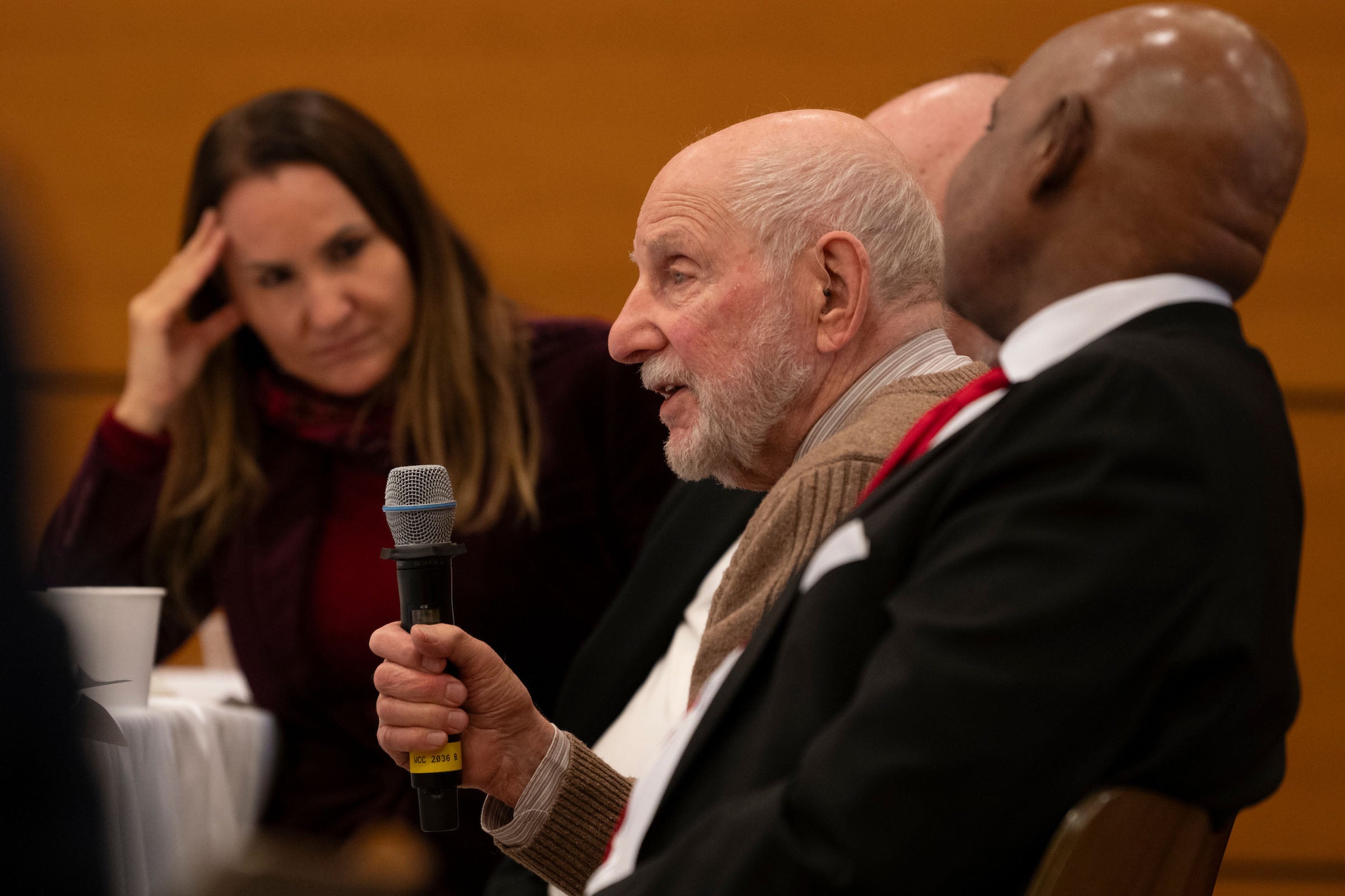
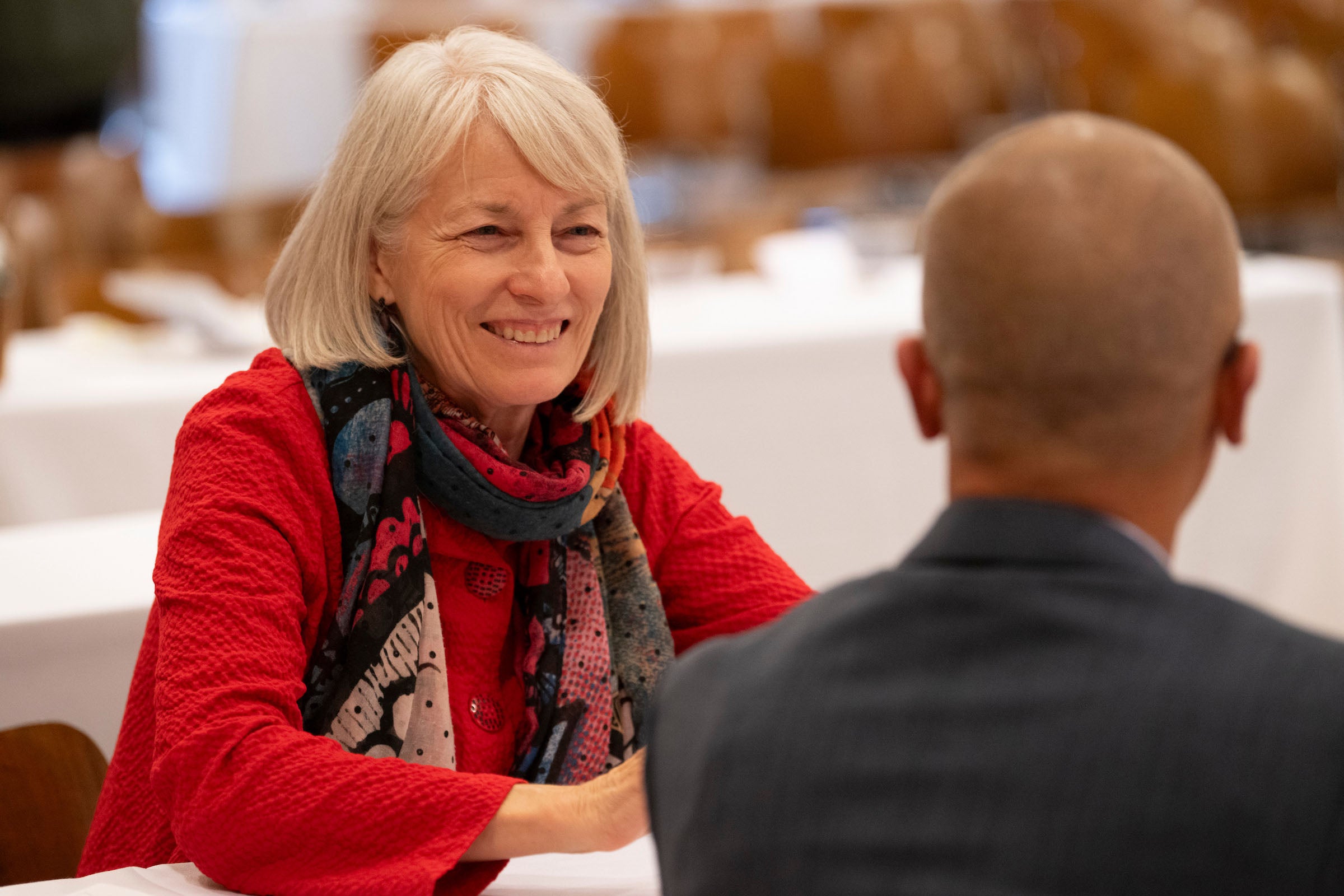
The legal state of women’s rights is more precarious, said Jessica Neuwirth ’85, director of the Human Rights Program at Hunter College and a founder of the group Equality Now. While laws protecting women exist in many countries, she said, there are lingering problems with enforcement.
“I think we’re seeing an alarming regression” on such rights, she said, noting that women’s groups in the Gambia have just managed to prevent the rollback of a 2015 law banning female genital mutilation (FGM). The law, she said, was only used last year when a man was arrested for circumcising two baby girls. His arrest angered parliamentary leaders who moved to repeal the law.
“That incident made it really clear that implementing the ban of FGM to stop the harmful practice is not going to be easy,” she said. Likewise, an effort in Sierra Leone recently failed to amend the Child Protection Act to include FGM.
“We’re all watching the rollback of women’s rights here in the United States as well,” she said. “We can’t even get the Equal Rights Amendment into our Constitution. … What is happening in Afghanistan is a complete travesty. After 20 years of women serving as lawyers, judges and ministers, the Taliban is back in power, and virtually every week there is a new decree preventing girls from going to school, women from working, singing, or going to parks, and now even from being seen or heard in public. … So, I think the present is a little bleak.”
The best hope for the future, she said, would be enforcement of existing laws, but “I don’t think that’s a given. I think lawyers like to write laws. I think it’s more interesting and creative and intellectually challenging. And the enforcement is kind of tedious. … Just imagine: What would the world look like if all the obligations of CEDAW (the international Convention on the Elimination of All Forms of Discrimination Against Women) were fully complied with, and the recommendations of the Beijing Platform for Action were fully implemented? I think it’s almost unimaginable, and it would be pretty great.”
Gerald Neuman ’80, director of the Human Rights Program at the Law School, examined the mixed results of the U.N. Committee for the Elimination of Racial Discrimination (CERD) in dealing with matters of international conflict. In a 2021 case, Qatar v. United Arab Emirates, the International Court of Justice, the principal judicial arm of the U.N., determined that discrimination based on nationality fell outside the scope of CERD enforcement. Similarly, when Ukraine filed suit against Russia for its occupation of the Crimea, the court found that Russia’s aggression did not constitute discrimination because it was based on politics rather than ethnicity.
On the other hand, the court’s advisory opinion this summer on the Israeli occupation of Palestinian territories found that some discriminatory practices were CERD violations. “I hope,” Neuman said, “we may be seeing the beginning of a course correction which will bring the International Court of Justice more into line with human rights law … The world needs robust prohibition of racial discrimination, both direct and indirect.”
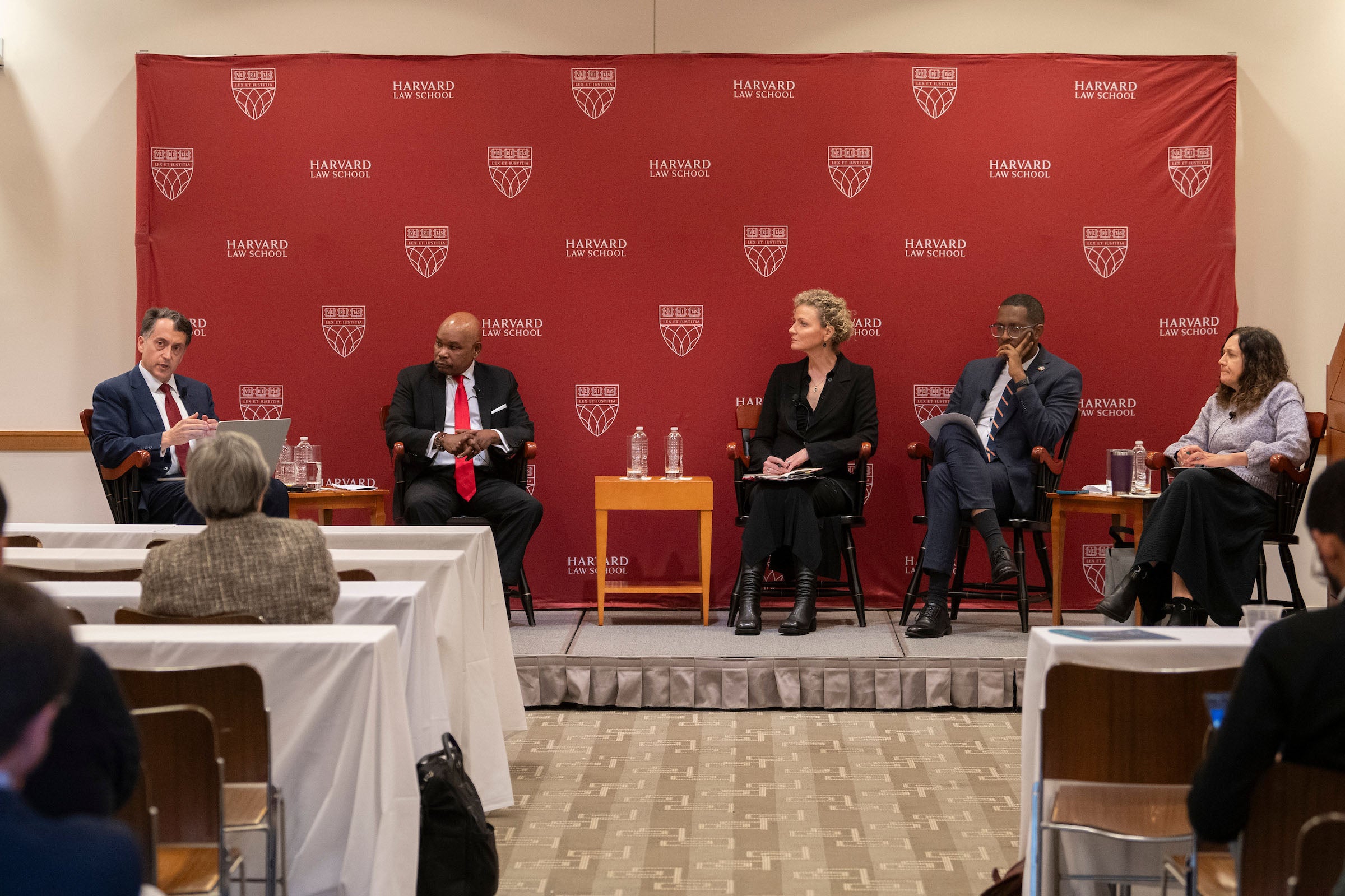
The afternoon panel dealt with what moderator Alicia Ely Yamin ’91, a lecturer on law and the director of the Global Health and Rights Project at the Petrie-Flom Center at the Law School, called “the savage inequalities that infect our world.” Since she was an idealistic student in the ’80s, she said, the balance has shifted: “We have learned a lot about the political economies that have changed over these decades and how much wealth and power has gone to the top 1% that now controls approximately half the capital in the world. … That is a very difficult situation in which to produce social endowments that make the promise, the rhetorical promise, of economic and social rights — including health rights — real to people.”
SUNY Distinguished Professor Makau Mutua S.J.D. ’87, former associate director of the Human Rights Program at Harvard Law, echoed that sentiment and noted that the idealism surrounding human rights, which he first absorbed during his own undergraduate years, has revealed practical limitations.
He noted the “professional depression” he felt over the failure of human rights advocates to deal with economic privation. “The depression is about the things that we promise, and the things we could not fulfill. We oversold, in my view, human rights. We oversold it. We gave the promise to people that once societies implemented the rights language, they would get to a particular resting point in history, a kind of summit, and that once they got there, they would see a glimpse of eternity.”
Recent events in Gaza, Ukraine, and the Middle East have posed a challenge to this strand of optimism, he said. “We ought to be more honest with ourselves. And part of that honesty is admitting that we failed to transform society by using this language.”
But rights don’t only apply to humans. Kristen Stilt, faculty director of the Animal Law & Policy Program at the Law School, argued that rights should extend to animals and to nature at large. She noted the adverse climate effects that livestock farming presents to humans as well as animals, and advocated broader awareness. “We need to move away from thinking about our world as a pyramid, where humans are at the top of everything — on top of animals, on top of oceans, on top of forests. And we need to move toward thinking about the world as what it actually is, which is an interconnected circle, or, better yet, a web of interconnection.”
Even the law, she said, reinforces human dominance over nature. She noted a 19th century case, Pierson v. Post, a dispute over a fox as a piece of property. “Why do we get to capture a wild animal and thereby own her? Shouldn’t the fox have a right to her liberty and her bodily integrity? And so, the language and concept of animal rights is important to elevate here … because it demands that we examine our own use of animals and question why.”
Gallery: Envisioning the Future
Want to stay up to date with Harvard Law Today? Sign up for our weekly newsletter.
